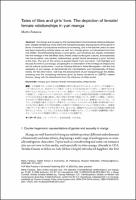Chapter Tales of lilies and girls’ love. The depiction of female/female relationships in yuri manga
Abstract
Yuri manga are focused on the representation of sentimental relations between girls. Despite still being a niche within the manga landscape, the popularity of this genre in terms of number of productions and fans is increasing, and in the last few years its fame has been expanding outside Japan as well. As a manga genre, yuri developed since the mid-2000s. Notwithstanding being a novel genre, yuri narratives are deeply embedded into the heritage of the late Meiji-early Shōwa shōjo bunka (girls’ culture), and especially into the so-called “esu kankei” relationships, girl/girl bonds developing in girls’ schools at the time. The aim of this article is double-folded: from one hand, I will highlight and discuss the birth of yuri manga, analysing the re-elaboration of the heritage of shōjo bunka and its cultural productions - such as Yoshiya Nobuko’s Hana Monogatari - into the first examples of yuri manga, to demonstrate the intermediality and intertextuality of these media. On the other hand, I will map the development of yuri manga through the 2000s, stressing onto the increasing relevance given by these narratives to LGBTQ+ related themes, along with the detachment from the influence of shōjo bunka.


 Download
Download Web Shop
Web Shop